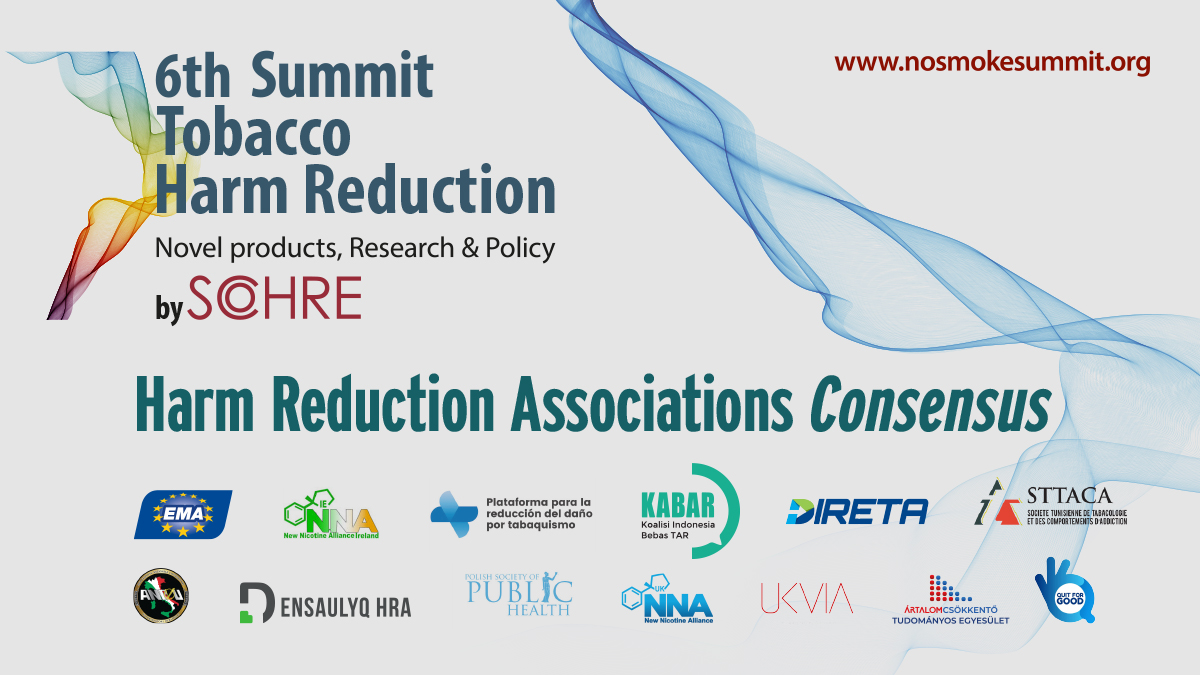CONSENSUS
Join forces with SCOHRE towards
a new broader approach to smoking control policies!

CONSENSUS
Join forces with SCOHRE towards a new broader approach to smoking control policies!

Harm Reduction Associations Consensus led by SCOHRE
The implementation of the Framework Convention on Tobacco Control (FCTC), was the first global health treaty, negotiated under the auspices of the World Health Organization (WHO) in response to the globalization of the tobacco epidemic (WHO Framework Convention on Tobacco Control). The implementation of smoking control efforts that followed has achieved a great deal. However, the reality we face today, several decades into the public health campaign, is that smoking is still a major public health issue; the number of smokers exceeds 1 billion, we count more than 8 million premature deaths every year from smoking-related diseases, and the number of smokers is growing.
It is agreed that although nicotine is addictive, it plays only a very minor role in smoking related mortality and has been successfully used as medication in smoking control and smoking cessation. Smoking cessation and prevention remain the two most impactful and cost-effective interventions in medicine, but have been unable to prevent the smoking epidemic. We believe that smoking control strategies should be reshaped to include harm reduction, and alternative lower risk products should be encouraged, besides the traditional smoking cessation and smoking prevention measures.
There is mounting evidence in the literature about tobacco harm reduction (THR) but still there is resistance to include THR strategies in the fight against the detrimental effects of smoking and to empower those who are not able to quit smoking. In an era of technological innovation, new approaches continuously emerge based on safer alternatives than cigarettes, for those smokers who for various reasons will not otherwise give up smoking completely. Switching to less harmful products will have a tremendously positive effect for many people who smoke cigarettes.
In its Article 1 Use of terms of the FCTC, it is explicitly stated (d) “tobacco control” means a range of supply, demand and harm reduction strategies that aim to improve the health of a population by eliminating or reducing their consumption of tobacco products and exposure to tobacco smoke. However, WHO remains strongly against THR! The Tenth session of the Conference of the Parties (COP10) to the WHO FCTC in Panama in November 2023 will explore the topic of how governments should regulate novel and emerging tobacco and nicotine products. We want to convey a strong message to them to consider that most novel products are aligned with the principles of harm reduction, defined in article 1 of the FCTC. Unfortunately, the position of WHO, is that these products are a threat to public health and somehow a risk to progress made so far in fighting smoking. The case of Sweden and snus, an example now replicated in other countries where lower risk alternatives have been accessible, provides compelling evidence that nicotine is not responsible for most of the detrimental effects of smoking, and such evidence is ignored or misrepresented.
It is imperative to provide all stakeholders with science-based and balanced information on the effects of nicotine versus the detrimental effects of smoking! Healthcare and public health professionals need to continuously raise awareness to every person who smokes cigarettes and to the overall population about the adverse effects of smoking. Yet, there is overwhelming evidence that limiting the negative effects of smoking can be also achieved by tobacco harm reduction, i.e. with novel safer alternatives to cigarettes.
We need to increase the knowledge that empowers people to pursue better health. That includes creating more opportunities for the education of health policy experts, regulators, and general public; to properly explain the benefits of smoking cesation as well as of harm reduction. Better informed patients lead to better outcomes. Better informed doctors and public health officials lead to better informed patients. Better informed politicians lead to more effective policies. Regulators and policymakers should make informed evidence-based decisions.
We believe that the generation of evidence should not be prevented. Therefore, we strongly believe that more research and publications are needed and that the newer products should be scientifically evaluated against combustible cigarettes! We acknowledge that the debate on tobacco harm reduction is still facing a lot of opposition from some of the key actors, including policy and regulatory bodies. Nevertheless, we believe that more studies will cast out all doubt. We need openness and academic freedom to generate robust evidence and implement innovative public health policies.
There is a need to step up the efforts and benefit from the already existing solid expertise in many countries: sharing and publicizing the latest scientific data, identifying research gaps, independently verifying industry data, focusing on people who smoke (what are the needs of those who want to quit smoking, as well as how to effectively help those who are not willing to quit), sharing policy recommendations, evaluating interventions, etc.
We believe creating a generic narrative and discourse that all nicotine products are equally harmful to cigarettes with respect to one’s health is misleading and deadly, and authorities should ensure dissemination of truthful non-misleading information.
Authorities have the obligation to inform citizens about the relatively lower risks that the newer products have vs. the undoubtedly deadly cigarettes. The failure to inform the public on relative risks and to encourage cigarette smokers to switch to safer nicotine alternatives is a violation of consumer rights and constitutes public health malfeasance.
SIGN THE CONSENSUS
Supporting Associations signing the Consensus:
- European Medical Association (EMA) – Manuel Pais-Clemente
- New Nicotine Alliance {Ireland} – Tom Gleeson
- Platform for the Reduction of Harm due to Tobacco Consumption {Spain} – Fernando Fernández Bueno
- Indonesian Tar Free Coalition (KABAR) {Indonesia} – Amaliya Amaliya
- DIRETA {Brazil} – Alexandro Lucian
- Tunisian Society of Tobaccology and Addictive Behaviors {Tunisia} – Fares Mili
- Associazione Nazionale Consumatori Vaporizzatori Personali (ANPVU) {Italia} – Carmine Canino
- Densaulyk Harm Reduction Association {Kazakhstan} – Gintautas-Yuozas Kentra
- Polish Society of Public Health {Poland} – Andrzej M. Fal
- New Nicotine Alliance {UK} – Louise Ross
- UKVIA {UK} – John Dunne
- Hungarian Scientific Association for Harm Reduction and Environmental Diseases {Hungary} – Emil Toldy-Schedel
- Quit for Good {Philippines} – Lorenzo Mata


